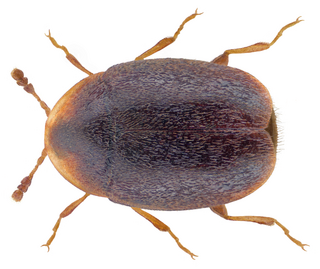
Corylophidae is a family of minute hooded beetles, sometimes called minute fungus beetles, in the order Coleoptera. There are about 18 genera and at least 120 described species in Corylophidae.

The Donaciinae, aquatic leaf beetles, are a subfamily of the leaf beetle family Chrysomelidae, characterised by distinctly long antennae. They are found in mainly the Holarctic, with very few species in the Southern Hemisphere.

Platynus is a genus of ground beetles in the family Carabidae. There are at least 190 described species in Platynus.
Metriini is a tribe of ground beetles in the family Carabidae. There is at least one genus, Metrius, in Metriini.

Paussini is a tribe of ground beetles in the family Carabidae.
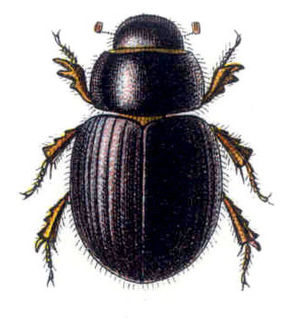
Aegialiinae is a small subfamily of the family Scarabaeidae, which contains all species of scarab beetles. Historically the group has been treated as a tribe within a broad definition of the subfamily Aphodiinae.

Nitidulinae is a subfamily of sap-feeding beetles in the family Nitidulidae. There are about 17 genera and at least 70 described species in Nitidulinae.
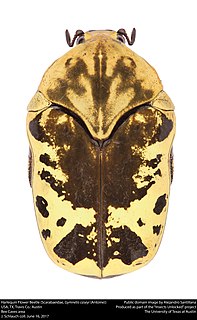
Gymnetini is a tribe of fruit and flower chafers in the family Scarabaeidae. There are 34 genera in Gymnetini, mostly New World.

Tritomini is a tribe of pleasing fungus beetles in the family Erotylidae. There are about 7 genera and at least 30 described species in Tritomini.
Zygaenodini is a tribe of fungus weevils in the family Anthribidae. There are at least 3 genera and 20 described species in Zygaenodini.

Xenoscelinae is a subfamily of pleasing fungus beetles in the family Erotylidae. There are about 8 genera and 12 described species in Xenoscelinae.
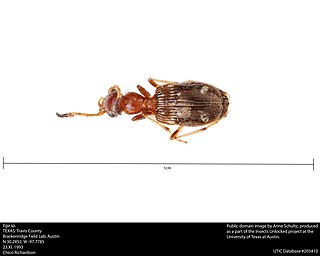
Lachnophorini is a tribe of ground beetles in the family Carabidae. There are about 6 genera and 11 described species in Lachnophorini.

Nitidulini is a tribe of sap-feeding beetles in the family Nitidulidae. There are about 10 genera and at least 20 described species in Nitidulini.

Helopini is a tribe of darkling beetles in the family Tenebrionidae. There are at least 3 genera and 20 described species in Helopini.
Syndesinae is a subfamily of stag beetles in the family Lucanidae. There are at least two genera and four described species in Syndesinae.

Malachiini is a large tribe of soft-winged flower beetles in the family Melyridae.
Hedobiini is a tribe of death-watch and spider beetles in the family Ptinidae. There are at least two genera and three described species in Hedobiini.
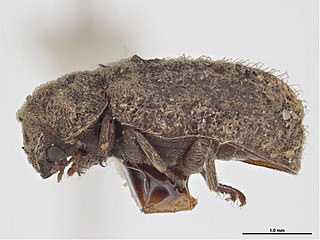
Endecatomidae is a family of beetles in the order Coleoptera. There is one genus, Endecatomus, in Endecatomidae, and four species. Endecatomidae was formerly treated as a subfamily of Ciidae or Bostrichidae.

Clivinini is a tribe of ground beetles in the family Carabidae. There are at least 60 genera in Clivinini.
Prometopinae is a subfamily of sap-feeding beetles in the family Nitidulidae. There are about eight genera in Prometopinae, including one North American genus, Prometopia.














